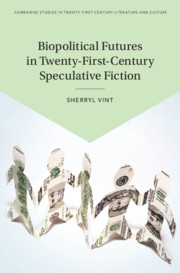Book contents
- Biopolitical Futures in Twenty-First-Century Speculative Fiction
- Cambridge Studies in Twenty-First-Century Literature and Culture
- Biopolitical Futures in Twenty-First-Century Speculative Fiction
- Copyright page
- Contents
- Acknowledgments
- Introduction
- Chapter 1 Suspending Death, Reinventing Life
- Chapter 2 The New Flesh
- Chapter 3 Capital Reproduction
- Chapter 4 Surplus Value
- Chapter 5 Life Industries
- Chapter 6 Living to Work
- Chapter 7 Life Optimized
- Chapter 8 Surplus Vitality and Posthuman Possibilities
- Conclusion
- Notes
- Bibliography
- Index
Chapter 2 - The New Flesh
Vital Machines and Reimagining the Human
Published online by Cambridge University Press: 16 September 2021
- Biopolitical Futures in Twenty-First-Century Speculative Fiction
- Cambridge Studies in Twenty-First-Century Literature and Culture
- Biopolitical Futures in Twenty-First-Century Speculative Fiction
- Copyright page
- Contents
- Acknowledgments
- Introduction
- Chapter 1 Suspending Death, Reinventing Life
- Chapter 2 The New Flesh
- Chapter 3 Capital Reproduction
- Chapter 4 Surplus Value
- Chapter 5 Life Industries
- Chapter 6 Living to Work
- Chapter 7 Life Optimized
- Chapter 8 Surplus Vitality and Posthuman Possibilities
- Conclusion
- Notes
- Bibliography
- Index
Summary
This chapter explores why the liberal humanist dispositif cannot initiate a better future. Returning to Wynter’s critiques of the human as a colonial category, it links her work with Lisa Lowe’s analysis of labor, empire, and humanization to argue that the human of liberal humanist tradition is fundamentally a category of whiteness. It reads two speculative fiction texts: HBO’s reboot series Westworld, which positions viewers to sympathize with robotic Hosts who are repeatedly traumatized by humanity’s violent fantasies in its empire-themed recreation parks; and Jo Walton’s Thessaly series that explores the related issues of how a culture determines personhood and that it requires someone to perform the labor traditionally done by slaves, by positing an experiment in which Plato’s Republic becomes a material reality. Contextualized within the real subsumption of life by capital, these narratives about the precarious lives of robotic entities are also about the lives of people who are excluded from the protections conferred by the status “human” and discourses of human rights. Thus, the chapter concludes, dehumanization remains a potent force in globalized neoliberalism.
- Type
- Chapter
- Information
- Publisher: Cambridge University PressPrint publication year: 2021

